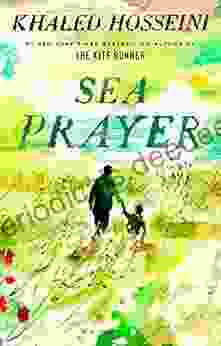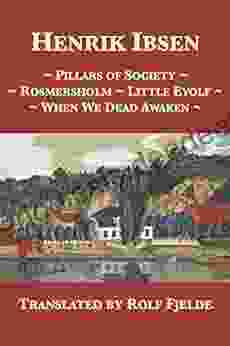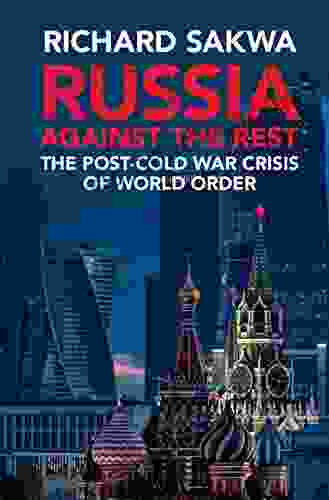The Post-Cold War Crisis of World Order

The end of the Cold War marked a watershed moment in global history. The bipolar structure that had defined international relations for nearly half a century collapsed, ushering in an era of unprecedented uncertainty and transformation. However, the post-Cold War period has also been marred by a persistent crisis of world order, characterized by a complex interplay of security challenges, global governance deficits, and multifaceted threats to human well-being. This article delves into the intricacies of the post-Cold War crisis of world order, examining its root causes, far-reaching implications, and potential solutions for forging a more stable, just, and sustainable global system.
5 out of 5
| Language | : | English |
| File size | : | 2231 KB |
| Text-to-Speech | : | Enabled |
| Screen Reader | : | Supported |
| Enhanced typesetting | : | Enabled |
| Word Wise | : | Enabled |
| Print length | : | 367 pages |
The Unraveling of the Global Security Architecture
The end of the Cold War brought about a profound shift in the global security landscape. The bipolar balance of power gave way to a more fragmented and multipolar system, characterized by the emergence of new powers and the weakening of traditional hegemons. This tectonic shift led to a number of challenges to international security, including:
Regional Conflicts:
The post-Cold War era has witnessed a proliferation of regional conflicts, as ethnic, religious, and territorial disputes flared up in various parts of the world. The disintegration of the Soviet Union and Yugoslavia, for instance, led to a series of bloody wars in the Balkans and the Caucasus. Similarly, the Middle East has been plagued by protracted conflicts, such as the Israeli-Palestinian conflict and the civil wars in Syria, Yemen, and Iraq.
Nuclear Proliferation:
The collapse of the Soviet Union raised concerns about the security of its vast nuclear arsenal. Furthermore, the spread of nuclear technology to additional states, such as North Korea and Iran, has heightened fears of nuclear proliferation and the risk of nuclear war. The potential for nuclear weapons to fall into the hands of non-state actors or terrorist groups poses an especially dire threat to global security.
Terrorism:
The rise of global terrorism has emerged as a major security challenge in the post-Cold War era. Transnational terrorist networks, such as al-Qaeda and ISIS, have carried out devastating attacks around the world, targeting civilians and destabilizing entire regions. The spread of extremist ideologies and the proliferation of small arms have further exacerbated the threat of terrorism.
Deficits in Global Governance
In addition to security challenges, the post-Cold War era has also been characterized by significant deficits in global governance. The institutions and mechanisms designed to maintain international order and cooperation have struggled to keep pace with the rapidly changing global landscape. Key challenges include:
Weak International Institutions:
Many international organizations, such as the United Nations, have been criticized for their perceived ineffectiveness in addressing global crises. Lack of consensus, funding constraints, and veto power held by permanent members of the UN Security Council have often hindered collective action and undermined the legitimacy of these institutions.
Economic Inequality:
Globalization has led to a widening gap between rich and poor, both within and between countries. Economic inequality has fueled social unrest, political instability, and conflict in many parts of the world. The lack of a comprehensive global framework for addressing economic inequality has exacerbated this problem.
Climate Change:
Climate change poses a formidable threat to global security and human well-being. The failure of international efforts to mitigate carbon emissions and adapt to the impacts of climate change has contributed to rising sea levels, extreme weather events, and resource scarcity, which in turn have led to displacement, conflict, and food insecurity.
Threats to Human Well-being
The post-Cold War crisis of world order has had a profound impact on human well-being. A complex interplay of factors, including poverty, disease, and violence, has contributed to widespread human suffering in many parts of the world.
Poverty and Inequality:
Poverty and inequality continue to afflict billions of people globally. The lack of access to basic necessities, such as food, clean water, and healthcare, perpetuates a cycle of deprivation and vulnerability. Economic inequality further exacerbates these problems, as the benefits of globalization have disproportionately accrued to the wealthy elite.
Disease and Pandemics:
The post-Cold War era has seen the emergence and spread of new and deadly diseases, such as HIV/AIDS, SARS, and COVID-19. Weak health systems and lack of access to medical care have made many populations vulnerable to these diseases, leading to widespread suffering and loss of life.
Violence and Displacement:
Conflicts, persecution, and natural disasters have forced millions of people to flee their homes in search of safety. Refugees and internally displaced persons often face immense challenges, including lack of shelter, food, and protection from violence. The increasing number of displaced persons poses a significant humanitarian crisis and destabilizes entire regions.
Paths Towards a More Stable World Order
Addressing the post-Cold War crisis of world order requires a comprehensive and collaborative approach. While there is no easy solution, a number of key steps can be taken to forge a more stable, just, and sustainable global system:
Strengthening International Institutions:
Reforming and strengthening international institutions, such as the UN, is crucial for enhancing global cooperation and addressing global challenges. This involves increasing their effectiveness, accountability, and inclusivity, ensuring that they reflect the changing balance of power and the needs of the global community.
Promoting Inclusive Economic Development:
Creating a more equitable global economic system is essential for reducing poverty, addressing inequality, and promoting sustainable development. This requires promoting fair trade, regulating global finance, and implementing policies that support inclusive growth and job creation.
Addressing Climate Change:
Mitigating climate change and adapting to its impacts is imperative for safeguarding human well-being and protecting the planet. Global cooperation is necessary to reduce carbon emissions, promote renewable energy, and develop resilience to climate-related disasters.
Investing in Human Security:
Investing in human security by providing access to basic necessities, education, healthcare, and protection from violence is crucial for reducing human suffering and fostering sustainable development. This involves strengthening social safety nets, promoting human rights, and providing humanitarian assistance to those in need.
Promoting Education and Dialogue:
Education and dialogue are essential for fostering mutual understanding, tolerance, and cooperation among different cultures and regions. Promoting intercultural exchange, supporting independent media, and countering hate speech and extremism can help to create a more peaceful and harmonious world.
The post-Cold War crisis of world order is a complex and multifaceted phenomenon that poses significant challenges to global security, governance, and human well-being. Addressing this crisis requires a concerted effort by all stakeholders, including governments, international organizations, civil society, and the private sector. By strengthening international institutions, promoting inclusive economic development, addressing climate change, investing in human security, and fostering education and dialogue, we can work towards a more stable, just, and sustainable world order that benefits all.
5 out of 5
| Language | : | English |
| File size | : | 2231 KB |
| Text-to-Speech | : | Enabled |
| Screen Reader | : | Supported |
| Enhanced typesetting | : | Enabled |
| Word Wise | : | Enabled |
| Print length | : | 367 pages |
Do you want to contribute by writing guest posts on this blog?
Please contact us and send us a resume of previous articles that you have written.
 Novel
Novel Chapter
Chapter Text
Text Story
Story Genre
Genre Paperback
Paperback E-book
E-book Newspaper
Newspaper Paragraph
Paragraph Sentence
Sentence Bookmark
Bookmark Glossary
Glossary Annotation
Annotation Footnote
Footnote Scroll
Scroll Library card
Library card Biography
Biography Autobiography
Autobiography Memoir
Memoir Encyclopedia
Encyclopedia Dictionary
Dictionary Thesaurus
Thesaurus Resolution
Resolution Borrowing
Borrowing Stacks
Stacks Research
Research Scholarly
Scholarly Lending
Lending Reserve
Reserve Reading Room
Reading Room Rare Books
Rare Books Interlibrary
Interlibrary Literacy
Literacy Study Group
Study Group Dissertation
Dissertation Storytelling
Storytelling Awards
Awards Book Club
Book Club Theory
Theory Textbooks
Textbooks James O Dea
James O Dea Ernest Mandel
Ernest Mandel Lynn Romaine
Lynn Romaine Sandra Cisneros
Sandra Cisneros Jove Chambers
Jove Chambers Sabrina Flynn
Sabrina Flynn William Michael Cunningham
William Michael Cunningham Ethan Williams
Ethan Williams James R Crockett
James R Crockett May Mcgoldrick
May Mcgoldrick I Q Hunter
I Q Hunter D K Holmberg
D K Holmberg Denis Rothman
Denis Rothman Bernard Scott
Bernard Scott Jaako Diako
Jaako Diako Susanne Madsen
Susanne Madsen J Timothy Caldwell
J Timothy Caldwell Shawn F Morris
Shawn F Morris John Sazaklis
John Sazaklis Rebecca Felix
Rebecca Felix
Light bulbAdvertise smarter! Our strategic ad space ensures maximum exposure. Reserve your spot today!
 Davion PowellFollow ·2.1k
Davion PowellFollow ·2.1k Timothy WardFollow ·15.5k
Timothy WardFollow ·15.5k Rodney ParkerFollow ·14.3k
Rodney ParkerFollow ·14.3k Ervin BellFollow ·4.8k
Ervin BellFollow ·4.8k Dylan MitchellFollow ·8.7k
Dylan MitchellFollow ·8.7k Chad PriceFollow ·2.7k
Chad PriceFollow ·2.7k Edmund HayesFollow ·12.7k
Edmund HayesFollow ·12.7k Billy PetersonFollow ·17.6k
Billy PetersonFollow ·17.6k

 Anton Chekhov
Anton ChekhovClarinet Fundamentals: A Systematic Fingering Course for...
Welcome to the exciting world of...

 Gage Hayes
Gage HayesSea Prayer: A Haunting and Heartbreaking Story of...
Sea Prayer, the latest...

 Henry Green
Henry GreenPillars of Society Rosmersholm Little Eyolf When We Dead...
Henrik Ibsen, the towering...

 Robert Reed
Robert Reed10 For 10 Sheet Music Classical Piano Favorites: A...
Learning to play the...
5 out of 5
| Language | : | English |
| File size | : | 2231 KB |
| Text-to-Speech | : | Enabled |
| Screen Reader | : | Supported |
| Enhanced typesetting | : | Enabled |
| Word Wise | : | Enabled |
| Print length | : | 367 pages |
















